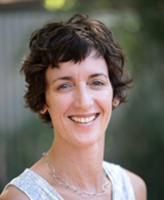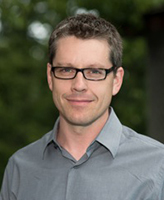Mary Celeste Kearney, whose work focuses on gender, youth, and media culture, joins Notre Dame’s Department of Film, Television and Theater (FTT) this fall as associate professor.
Michael Kackman, a cultural historian and media scholar, will also join FTT as special professional faculty. Kackman and Kearney, who often collaborate, previously taught at the University of Texas at Austin.
“Academic departments are usually enthusiastic about new faculty but Mary Kearney and Michael Kackman are truly ‘transformative hires’—which means they will enable us to do things that we have never been able to do before in television studies,” says Professor James Collins, chair of FTT. “In addition to being internationally known television scholars, they are both exceptional teachers. We’re thrilled that they’ve joined us.
“They will have an enormous impact on our curriculum and on FTT as a learning community.”
Research and Risk-taking

Kearney is currently writing Power Chords and Groupie Chicks (Oxford University Press), a book on gender and rock culture that was inspired by her passion for rock music and her classes on the subject. Another book in the works, called Making Their Debut, will explore the emergence of teen-girl media in the mid twentieth century.
Both works will find their way into her classrooms at Notre Dame, she says.
“Virtually all of my classes have been related to my research interests, so I’ve been able to use my own scholarship in the classroom quite a bit,” Kearney says. “Students are always more enthused when professors present their research rather than that of someone else.” This personal approach, she notes, can also help get students interested in particular aspects of media culture—and in pursuing their own projects.
“I believe strongly that research is more about asking good questions than finding the ‘right’ answers,” she says, “and that the role-modeling of my intellectual uncertainty provides students with greater confidence to take risks in their research.”
This year Kearney will teach an introductory course in feminist media studies (Women and Media Culture) as well as an advanced seminar called Girls’ Media and Cultural Studies, which she describes as “an introduction to feminist studies of girlhood, girls’ culture, and girl-centered media production and reception.”
“As far as I know, I’m the first professor to create such a class, and I love teaching it since it’s closest to my areas of expertise.”
Appetite for Idiosyncrasy

Kackman will be teaching History of Television, TV Genres, and a University Seminar for first-year students called The Popular Past. That course, he says, examines how we engage with the past in our everyday lives—“from eBay to retro TV to film costume dramas to scrapbooking, we are constantly collecting, archiving and recontextualizing the shards of the past.”
He is interested, he says, in questions of context: How and why do films and television programs emerge from—and help shape—a particular time, place and culture?
“My first book was about spy shows and the Cold War,” Kackman says. “I was initially interested in how these strange programs emerged from the highly restrictive political, economic, and cultural context of early 1950s America, and how they gave voice to it. I’m working on a similar kind of trajectory with an historical project on the emergence of children’s Westerns on television.”
Kackman also explores contemporary TV, writing recently about shows that construct a “kind of fictive national community” such as HBO’s The Newsroom.
“If there’s one consistent theme in my teaching and research, it’s an appetite for idiosyncrasy,” he says. “Studying mass media, it’s easy to leap to huge generalizations; I try to push against that tendency. I’m more interested in the failed experiment than the mega-hit, and the oddball TV viewer than the ‘typical’ one. In the classroom, that means we’ll spend more time watching Cop Rock than NYPD Blue.”
Scholarly Community
Kearney and Kackman both say they are excited about continuing their various projects in the “supportive environment” at FTT, and they specifically cited their enthusiasm in being able to collaborate with fellow faculty members in film, theatre, and television.
Along with FTT Associate Professor Christine Becker, Kackman currently hosts a monthly media studies podcast called Aca-Media, which he believes can benefit his students by getting authors to “step out of the boundaries of conventional academic discourse and simply reveal why they love to write about what they do.”
Kearney is a board member for Console-ing Passions, a conference series in feminist TV and media studies started in 1992 and sponsored once by FTT in 2000. She hopes to bring it back to Notre Dame at some point in the future.
She is also a founding director of Cinemakids, which offers screenings and filmmaking classes for kids 6 to 12 years old. The program will go on hiatus as she transitions, but she plans to reboot it at ND in 2014 with support from FTT.
Kackman and Kearney are also co-editing a new anthology called The Craft of Criticism, which will feature chapters on different approaches to media studies, from narrative and genre analysis to globalism and new technologies. They plan on hosting a conference with the authors at Notre Dame in late spring 2014.
“Notre Dame is one of the most respected research institutions internationally, and I’m proud to become part of its community and legacy,” Kearney says.
“I’m also glad to have the opportunity to work for an institution that has social justice and international outreach as two of its primary missions. I’m excited about the possibilities for my research, as well as sponsoring visitors and organizing conferences. Oh, and did I mention that I’m Irish?”
Learn More >
- Department of Film, Television, and Theatre
- Mary Celeste Kearney faculty page
- Michael Kackman faculty page
- Console-ing Passions
- Cinemakids
- Aca-Media
Originally published by at al.nd.edu on September 17, 2013.